#Post Graduate Program in Development Management (
Explore tagged Tumblr posts
Text

Post Graduate Program in Development Management - ISDM
Are you passionate about social change and want to make a difference? Join ISDM's Post Graduate Program in Development Management and gain the skills and knowledge required to succeed in the social sector.
0 notes
Text
PGDM: A Gateway to a Thriving Career in Business - Top Business Schools in India

#Post Graduate Diploma in Management#Business Schools in India#Specializations in PGDM#Leadership Skills#Networking Opportunities#PGDM Program#Business Management#Soft Skills Development#Top PGDM Colleges
1 note
·
View note
Note
hiiiii I just saw ur post abt being deathly bored and wanting asks
was wondering if u have any university! yellowjackets headcanons? literally anything, i’m trying to project my uni experience onto them lol
I LOVE THIS OMG, doing it assuming everyone survives, no plane crash au, this is also the main seven :)
jackie- rutgers baddie, she definitely finally found her way to lesbianism in college and shes majoring in like business or whatever (i have no idea what she would want to be as an adult and that scares me) i read this amazing fic where she moved in with nat instead of going to college and she ended up becoming like the girl version of a handyman or whatever like i don’t remember all the details but i lowkey see that futch transformation for her in her college years
shauna- she went to brown x but she probably she went to europe for a gap year at some point or did an abroad program idk how she did it but she dated french people and had extremely messy breakups x she passed her classes with flying colors by some grace of god x she will be holding onto the jackie ordeal no matter how many europeans she slept with at uni xoxoxox
tai- her uni experience went exactly how she described it in the show; first string on the soccer team, graduating from law school with honors, so so many hot girlfriends 💋 she want it she got it like i have no notes. she is a HARD WORKER and she EARNS HER SHITTT, somehow is managing all that while still partying like crazy. college taissa turner you sly dog you are so so loved
van- our little film major, she is 100% making a bunch of mini movies in college for various film classes. in another life she was a director and that’s what i see for her path at university. tell me she wouldn’t be an amazing director, the way she analyzes movies and shit. van is also the type of person to leave a boring class making a REALLY stupid excuse. you also can’t tell me she was not getting around in college. she was.
misty- this one stumped me so hard but like then i got to thinking she probably could have gotten into a really good school because she’s the type of weird girl who has really good grades, and then she ends up developing a caffeine addiction and being that person who signs up for all the early morning classes and she’s like one of three people who did, misty you are just as much of a silly freak in college and we love you for it!!
nat- i feel like she wouldn’t be going to uni bc i feel like that’s not really her scene, but if she did she would def somehow find out about every party that happens on campus and always be in attendance no matter what. like it’s not even her friend group, but she’s trying to make the dj play grunge music at the sorority pledge party or whateverthefuck. not trying to reduce nat to the whole “she’s just an alcoholic party girl” thing, i just geniunely think that’s something that would definitely be happening unexplainably.
lottie- she’s going to college on another CONTINENT, like my girl is not trying to stay in new jersey. she’s going to school somewhere rich and prestigious (if you’ve got the benefits, use em!!) in like the most random place. japan, ireland, australia, the list could go on forever but i just know she is not staying anywhere near her parents or new jersey. lottie is also getting around in college, no questions asked. jackie is not the only one discovering her lesbianism x
this one made me THINKKKK, never stop sending me these kat i’m obsessed
#yellowjackets#yellowjackets college au#yellowjackets showtime#shauna shipman#jackie taylor#lottie matthews#taissa turner#misty quigley#misty fucking quigley#vanessa palmer#van palmer#natalie scatorccio#ella purnell#sophie nelisse#sophie thatcher#courtney eaton#liv hewson#sammi hanratty#jasmin savoy brown#yj#yj cast#yellowjackets cast
31 notes
·
View notes
Text
“A friend of mine is a well-known economist at a leading American university. He's also the gatekeeper for an elite doctoral program in his field. Asked once what he valued most in candidates for his program, he said, "an undergraduate degree in Classics." Homer and Virgil, of course, have very little to do with things like debt-deflation theory. But my friend's reasoning is, in fact, quite shrewd.
Since economics is a human (i.e., social) science, its practitioners should first know how to be actual human beings before learning their specialized skills. A formation in the classics or any of the other humanities is an immersion in beauty and knowledge. It has no utility other than enlarging the soul. But that achievement-the ennobling of a soul, the enlarging of the human spirit to revere the heritage of human excellence and to love things outside itself-is something no technical skill can accomplish.
As Leo Strauss once wrote, "liberal education is concerned with the souls of men, and therefore has little or no use for machines ... [it] consists in learning to listen to still and small voices and therefore in becoming deaf to loudspeakers."(18) A liberal education—a balanced experience of the humanities, art, music, mathematics, and the natural sciences—is designed to form a mature "liberal" adult; liberal in the original sense, meaning free as opposed to slave. Thus for Strauss, "liberal education is the counter-poison ... to the corroding effects of mass culture, to its inherent tendency to produce nothing" but specialists without vision or heart.(19)
Scholars like Anthony Esolen, Allan Bloom, Neil Postman, Matthew Crawford, and Alasdair MacIntyre, each in his own way and for different reasons, have all said similar things. For all of them, the point of a truly good education, from pre-K to graduate school, is to form students to think and act as fully rounded, mature, and engaged human beings. In other words, as adult persons of character.
As Matthew Crawford puts it, "Education requires a certain capacity for asceticism, but more fundamentally it is erotic. Only beautiful things lead us out of our addictive self-focus to join the world beyond our heads."(20) But the dilemma of postmodern life is that we can't agree on what a fully rounded, mature "human being" is—or should be. The fragmentation in American culture runs too deep. Recent battles over imposing gender ideology in school curricula and rewriting and politicizing civics and American history textbooks simply prove the point. So does the "progressive" intellectual conformism in so many of our university faculties.
Meanwhile, as American student skills decline in global comparisons, more and more stress is placed on developing STEM (science, technology, engineering, and math) competence at earlier student ages. There's nothing wrong with this in principle. Technical skills are an important part of modern life. But as we've already seen, American trust in the promise of technology is robust and naive to the point of being a character flaw. And a real education involves more profound life lessons than training workers and managers to be cogs in an advanced economy.”
-Archbishop Charles J. Chaput, Strangers in a Strange Land: Living the Catholic Faith in a Post-Christian World
—
(18) & (19) Leo Strauss, "Liberal Education and Mass Democracy," in Robert Goldwin, editor, Higher Education and Modern Democracy: The Crisis of the Few and Many (Chicago: Rand McNally, 1967), 73-96.
(20) Matthew Crawford, The World Beyond Your Head: On Becoming an Individual in an Age of Distraction (New York: Farrar, Straus and Giroux, 2015), 257.
#Politics#reactionary#traditionalism#modernism#Democracy#economics#Quotes#Archbishop Charles Chaput#Leo Strauss
6 notes
·
View notes
Text
Anon wrote: Hi mbti-notes, I am a INFJ in their late twenties. My purpose for this inquiry is to better understand, on a mbti-function level, why I am feeling emotionally overwhelmed and burnt out.
For additional context: I am currently in a graduate program that I detest—to the point where I’ve had to keep myself from crying at my desk in public. Usually, when I’m dealing with something arduous I can engage in some sort of Ni-led vision of what I want in the future to encourage myself to keep going. But lately I’ve just been so tired of trying to ‘inspire’ myself to keep moving.
On top of this, I feel like I can’t express my disdain for my work life to friends because they either work in the same field (and they enjoy it) or they are going through other issues of their own. In general, I find that people are (reasonably) concerned with their own sources of stress, and I don’t want to bother them about it again unless its serious.
Additionally, I have found it hard to meaningfully engage with such people about their own life. Instead of being attentive and curious about others’ lives, I now feel like I’m always thinking of my own problems. Is this because I am over-exerting myself (Fe) and not reflecting enough (Ni)? If it is a lack of Ni, then why do I feel so tired of trying to work with Ni (please see ’inspiring myself’ sentence earlier in my post)? Thank you so much for reading and considering my long entry—I really appreciate it.
----------------------
There are several factors that can contribute to burnout, so the solution will depend on which factors are most influential in your case. You'll have to reflect on it yourself and tailor the right solution. Possible factors include:
1) You are in poor physical health. Your body can only operate at peak efficiency if you eat well, sleep well, get enough exercise, and moderate stress. If you lack energy due to poor physical health, then you need to develop better physical habits.
2) You are expending more energy than you are generating. Ns often need to be reminded that physical and mental energy are finite resources. There is a limit to how much your mind and body can do every day. Everyone needs rest, relaxation, and recuperation time. This is especially the case for introverts. If your workload is too heavy, find a way to reduce it and/or schedule better. Proper work-life balance is necessary for making sure that you take enough time for yourself to recharge.
3) You are taking on too much. Are your work roles and responsibilities clearly articulated? Are you taking on tasks that don't belong to you or should be done by someone else? It's not uncommon for Js to be controlling and Ns to fear missing out, which means they end up doing more work than they should. If this is the case, you need to learn to manage your workload better by prioritizing, deferring, or delegating tasks more appropriately.
4) You are in a disadvantaged position and don't experience all the advantages of your peers. This can happen for a variety of reasons. For example, you might be experiencing overt or covert exclusion because of being a minority and not fitting in (due to class, race, gender, etc). Another example is that you have lower professional status than others, which you might be able to change through hard work and getting promoted to a higher position. Another example is that you haven't done enough to build professional relationships and aren't reaping those social rewards.
5) Your workplace is toxic. A workplace is experienced as unhealthy when you have unsupportive authority figures to contend with, overly competitive or undermining peers to watch out for, and/or unfair practices that don't reward people based on merit. When the social environment is toxic, you can try to improve the situation, or you can leave if you don't have the power to change anything. When leaving is not an option, try to limit engagement and increase positive engagement elsewhere in your life. The more time you spend in a toxic social environment, the more energy it will drain from you until you have no motivation at all.
6) You lack a healthy support system. You seem to downplay or ignore your own needs, which is a common INFJ issue. Yes, you should be professional when dealing with peers/colleagues in a workplace, so it's understandable that you don't want to be constantly discussing your personal issues with them. However, this raises the important question of why you don't have family or friends outside of school/work to lean on and get support from. It sounds like you're not doing enough to build a community for yourself, which leads to isolation and alienation, and eventually, depression that saps away your energy. Neglecting emotional and social needs means you're not taking care of your mental health and well-being. When you don't take care of yourself, you won't be able to attend to others.
7) You lack control and/or confidence. When people don't feel in control or don't feel confident enough to tackle their challenges, they're more likely to waste energy in feeling anxious, preoccupied, distracted, fixated on trivial matters, etc. If this is the case, you may need to be more assertive in: expressing your needs/wants and fulfilling them; organizing your environment to better suit you; clarifying your goals/aspirations; seeking help for improving knowledge and skills that would help you feel more self-confident.
8) You focus too much on the negative and discount the positives. Why is it that two people can work in the same environment but experience it completely differently? Part of it is due to perception. You don't like the work you're doing, so you are full of negative feelings and emotions that then cast everything in a negative light. If this is the case, you need to make more of an effort to recover the positive aspects of the situation. Looking on the bright side involves seeking out and realizing positive possibilities/potential, which should be easy enough with healthy Ni. Positives exist in the present, and you can create them in the decisions you make today. If you're always waiting for happiness to appear in a distant future, chances are, it's not real.
9) Your work doesn't seem to matter or get rewarded. Does this career align with your identity and values? It's hard to feel motivated when you don't believe in your work or others don't recognize your work. Does your work matter? Are there ways your work matters that you're not seeing and appreciating? If others aren't appreciating your work, have you done enough to show it off and keep people informed of your activities?
10) You are on the wrong life path. If you truly believe your work doesn't matter or isn't the right fit for you, why are you still doing it? Why aren't you listening to your own heart? This would constitute going against Ni, which is self-sabotaging. It sounds like you're using Ni-Ti to rationalize. Lying to yourself is only going to make you more and more miserable every time reality slaps you and debunks the lie. While it's true that it's not always easy to change paths, is it really harder than staying on the wrong path forever? I'm not telling you what to do but simply raising the possibility that you haven't done a proper reckoning of the path you've chosen and compared it objectively to the alternative paths that might be better suited to you. Remember that it's not foolish to make a mistake because mistakes are necessary for learning and growth. What's foolish is to deny a mistake and keep suffering from it for the rest of your life.
16 notes
·
View notes
Text
Top 10 Leadership Skills You’ll Develop in a PGP MBA Program
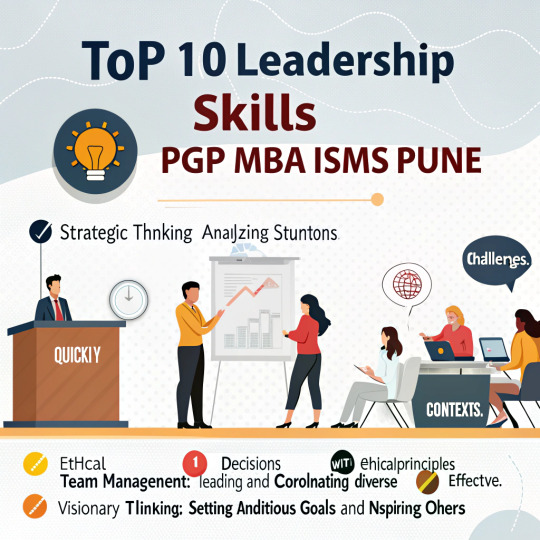
Stepping into a Post Graduate Program (PGP) in Management at ISMS Pune is like signing up for a rollercoaster that transforms you into a leader who’s ready to take on the world. Forget stuffy textbooks or endless lectures—this program is about real, messy, exhilarating growth. From day one, you’re diving into experiences that challenge you, push you, and shape you into someone who can inspire, adapt, and make things happen. As someone who’s been through the grind, here’s the lowdown on the top 10 leadership skills you’ll walk away with, packed with heart, humor, and honesty.
1. Strategic Thinking
You’ll learn to see the forest and the trees. Through case studies and hands-on projects, you’ll get good at spotting trends, connecting dots, and planning for the long haul. It’s like becoming a business fortune-teller, always one step ahead of the game.
2. Decision-Making Under Pressure
Ever had to make a big call with zero time to think? The PGP MBA throws you into high-stakes scenarios—think group projects with looming deadlines or simulations where every choice counts. You’ll learn to stay cool, weigh your options, and make decisions that hold up, even when the clock’s ticking.
3. Communication Skills
If you’ve ever fumbled a presentation or blanked on how to explain your big idea, this program’s got you. From pitching startup ideas to leading class debates, you’ll sharpen your ability to speak clearly, write persuasively, and charm the socks off anyone. You’ll find your voice, and it’ll be a game-changer.
4. Team Management
Leading a team sounds glamorous until you’re juggling clashing personalities and tight deadlines. Group projects will teach you how to delegate without micromanaging, motivate without being cheesy, and sort out drama like a pro. You’ll turn a ragtag crew into a squad that gets stuff done.
5. Emotional Intelligence (EQ)
Leadership isn’t just brains—it’s heart. Through late-night group work, mentor chats, and moments where you’re forced to look in the mirror, you’ll get better at reading people, building trust, and keeping your cool. It’s the secret sauce that makes people want to follow you.
6. Adaptability and Agility
The business world is like a plot twist in a movie—you never know what’s coming. The PGP MBA throws curveballs, from last-minute project changes to fast-paced simulations. You’ll learn to pivot, rethink, and keep going, no matter how wild things get. You’ll be the leader who laughs in the face of chaos.
7. Innovation and Creativity
Got a wild idea? This program will fan that spark into a flame. Through design thinking workshops and real-world business challenges, you’ll learn to dream up solutions that are fresh, bold, and downright clever. It’s about breaking the mold and building something new.
8. Ethical Leadership
Being a leader means doing the right thing, even when it’s hard. Courses on sustainability and corporate governance will drill that into you, but it’s the discussions and real-world dilemmas that hit home. You’ll learn to lead with integrity, earning respect that lasts.
9. Networking and Relationship Building
Your network is your superpower. Guest lectures, alumni meetups, and internships will throw you into rooms with big names and bigger ideas. You’ll learn to make connections that feel genuine, not schmoozy, and build relationships that open doors for years to come.
10. Vision and Purpose
The PGP MBA isn’t just about skills—it’s about finding your why. Through workshops, late-night chats with classmates, and moments of clarity, you’ll figure out what kind of leader you want to be. You’ll walk away with a sense of purpose that lights you up and drives everything you do.
Your Leadership Journey Starts Here
By the time you finish your PGP MBA at ISMS Pune, you won’t just be ready for a job—you’ll be ready to lead with guts, heart, and a vision that’s all your own. These skills, earned through sweat, laughs, and maybe a few late-night coffee runs, will set you up to tackle any challenge and inspire everyone around you. This isn’t just a program—it’s the start of something epic. Jump in, and get ready to become the leader you were meant to be.
[ISMS Pune, MBA college, one of the best MBA college in Pune, PGP-MBA Program, Job placement, MBA in Marketing]
2 notes
·
View notes
Text
Best Courses to Study in Australia for Indian Students with High ROI.

Why Australia is a Top Study Abroad Destination in 2025
Australia continues to rank among the top destinations for Indian students seeking world-class education, global career opportunities, and a multicultural lifestyle. With over 100,000 Indian students currently studying in Australia, the trend is fueled by high employability, quality institutions, and welcoming immigration policies. This blog provides a complete study guide in Australia for Indian students, focusing on the top courses offering the highest return on investment (ROI) in 2025.
Top Reasons to Study in Australia for Indian Students
Globally ranked universities like the University of Melbourne, ANU, and UNSW
Post-study work visas for up to 4 years
Pathways to Permanent Residency (PR)
Industry-relevant, skill-based courses
High graduate employability
Scholarships and financial support for Indian students
High ROI Courses for Indian Students in Australia
1. Information Technology and Computer Science
Why It’s Worth It:
Booming tech industry in cities like Sydney and Melbourne
Strong demand for software developers, AI specialists, and cybersecurity analysts
Excellent PR pathways via the Skilled Occupation List (SOL)
Career Opportunities:
Software Developer
Cloud Engineer
Cybersecurity Analyst
Average Salary: AUD 70,000 – 120,000
2. Engineering (Civil, Mechanical, Electrical, Mining)
Why It’s Worth It:
High demand for engineers in infrastructure, renewable energy, and mining
PR-friendly occupations
Hands-on, accredited programs (Engineers Australia recognition)
Career Paths:
Civil Engineer
Structural Engineer
Renewable Energy Consultant
Average Salary: AUD 75,000 – 130,000
3. Health Sciences & Nursing
Why It’s Worth It:
Acute shortage of skilled healthcare workers
Strong employment growth projected until 2030
Offers direct PR routes for nursing graduates
Career Opportunities:
Registered Nurse
Public Health Officer
Physiotherapist
Average Salary: AUD 65,000 – 110,000
4. Business Analytics and Data Science
Why It’s Worth It:
High demand across sectors (banking, retail, healthcare)
Versatile career paths with global appeal
STEM classification supports extended post-study work visa
Career Options:
Data Analyst
Business Intelligence Consultant
Data Scientist
Average Salary: AUD 85,000 – 130,000
5. Accounting and Finance
Why It’s Worth It:
Consistent job demand across Australia
Accredited courses (CPA Australia, CA ANZ)
Opens doors to roles in multinational firms
Career Opportunities:
Chartered Accountant
Financial Analyst
Auditor
Average Salary: AUD 70,000 – 115,000
6. Education and Teaching
Why It’s Worth It:
Australia’s school system seeks qualified teachers, especially in regional areas
Included in the Medium and Long-term Strategic Skills List (MLTSSL)
Roles After Graduation:
Primary School Teacher
Early Childhood Educator
Secondary School Teacher
Average Salary: AUD 65,000 – 100,000
7. Architecture and Construction Management
Why It’s Worth It:
Australia’s urban expansion and infrastructure projects
Recognized qualifications with global applicability
Popular Careers:
Architect
Project Manager
Construction Estimator
Average Salary: AUD 70,000 – 120,000
Cost of Education in Australia (2025)
Course Type
Average Annual Tuition (AUD)
UG Courses
20,000 – 45,000
PG Courses
22,000 – 50,000
MBA
40,000 – 80,000
Scholarships Available for Indian Students
Australia Awards Scholarships – Fully funded by the Australian government
Destination Australia Scholarships – Regional study scholarships worth AUD 15,000
University-Specific Grants – E.g., Monash International Merit Scholarship, University of Sydney International Scholarships
Post-Study Work Rights and PR Pathways
Australia allows international students to work up to 20 hours per week during semesters and full-time during breaks. Graduates can apply for a Temporary Graduate visa (subclass 485), offering work rights for 2–4 years depending on qualification and location.
PR Pathways via:
General Skilled Migration (GSM)
Employer-Sponsored Visas
Regional Migration Programs
How Eduvisor Can Help You Study in Australia
Navigating the Australian education system, choosing the right course, and applying for visas can be overwhelming. That’s where Eduvisor, a trusted study abroad consultant in India, steps in. Eduvisor offers personalized counseling, university shortlisting, scholarship assistance, SOP writing, and complete visa support — tailored for Indian students planning to study in Australia.
Final Thoughts
Choosing a high-ROI course in Australia is more than just picking a subject — it’s about aligning your passion with global trends. With the right guidance and planning, Australia can be your gateway to a successful international career. Use this study guide in Australia for Indian students as your blueprint for 2025 and beyond.
Ready to begin your journey? Let Eduvisor turn your study abroad dream into reality.
FAQs
Q1. What are the most affordable courses to study in Australia? A: Vocational Education & Training (VET) courses, TAFE programs, and regional university degrees are often more budget-friendly.
Q2. Is PR easy after studying in Australia? A: Courses on the SOL and MLTSSL lists (like IT, Nursing, Engineering) make it easier to qualify for PR.
Q3. How do I find scholarships to study in Australia? A: Government sites, university portals, and expert consultants like Eduvisor can help you explore scholarships based on merit, need, and region.
2 notes
·
View notes
Text
Study in Lithuania from Bangladesh 2025
Explore top universities, affordable tuition, and a seamless visa process to study in Lithuania. Start your journey today with Graduate Track!
Lithuania offers rich academic opportunities, an affordable living cost, and a high-quality education system, making it an attractive destination for students from Bangladesh. With globally recognized universities, English-taught programs, and excellent post-graduation prospects, Lithuania has become a preferred choice for international students.
This blog provides extensive knowledge on the courses you can study, how to apply, the average cost of tuition fees, steps to apply for a Lithuanian student visa from Dhaka, Sylhet, Chittagong and estimated living expenses.
Available Courses to Study in Lithuania Lithuania offers a diverse range of academic programs across various fields, making it a great destination for international students. Many universities provide English-taught programs, especially at the Bachelor’s, Master’s, and PhD levels. Here are some of the most popular courses for international students:
Business & Management Business Administration International Business Marketing & Digital Marketing Finance & Accounting Supply Chain Management Engineering & Technology Civil Engineering Mechanical Engineering Electrical & Electronics Engineering Renewable Energy & Environmental Engineering Artificial Intelligence & Robotics Information Technology (IT) & Computer Science Software Engineering Data Science & Big Data Analytics Cybersecurity Computer Science & AI Game Development Health & Medical Sciences Medicine Dentistry Nursing Pharmacy Public Health Social Sciences & Humanities Psychology International Relations Political Science Sociology Law Arts & Design Graphic Design Interior Design Visual Arts Music & Performing Arts Fashion Design Tourism & Hospitality Management Hotel & Restaurant Management Travel & Tourism Event Management Many Lithuanian universities collaborate with European institutions, offering Erasmus+ exchange programs, internships, and research opportunities.
Top Universities to Study in Lithuania Lithuania is home to several high-ranking universities that offer globally recognized degrees and a variety of English-taught programs. Here are some of the top universities in Lithuania for international students:
Vilnius University (VU) The oldest and largest university in Lithuania. Ranked among the top universities in Europe. Offers programs in Business, IT, Law, Medicine, and more. Strong research facilities and international collaborations.
Kaunas University of Technology (KTU) Best for Engineering, IT, and Business studies. Strong industry partnerships and innovation-driven education. Member of many international academic networks. Affordable tuition fees with scholarship options.
Vytautas Magnus University (VMU) Popular for Humanities, Social Sciences, and Arts. Offers flexible study programs and interdisciplinary courses. Active in student exchange programs like Erasmus+. Research-focused with international collaborations.
Vilnius Gediminas Technical University (VILNIUS TECH) Specializes in Engineering, Architecture, and IT. Strong focus on research, innovation, and technology. Provides students with internship and work opportunities. Has a modern campus with state-of-the-art facilities.
Lithuanian University of Health Sciences (LSMU) Best for Medicine, Dentistry, Nursing, and Pharmacy. Recognized by WHO and other medical organizations. Provides clinical training at affiliated hospitals. High acceptance rate for international medical students.
ISM University of Management and Economics One of the top universities for Business and Economics. Has strong industry connections for internships and placements. Offers globally recognized business degrees. Partnered with leading universities worldwide. These universities offer world-class education with affordable tuition fees, making Lithuania an attractive destination for Bangladeshi students.
Lithuanian Student Visa Processing Agency in Dhaka & Sylhet Applying for a Lithuanian student visa from Bangladesh requires expert guidance to ensure a smooth and hassle-free process. Graduate Track is the official student visa agency of Lithuania in Bangladesh, which specializes in helping students secure admission to top Lithuanian universities and obtain their visas successfully.
With offices in Dhaka and Sylhet, Graduate Track provides end-to-end support, including university selection, application processing, document preparation, visa assistance, and pre-departure guidance. If you’re planning to study in Lithuania, Graduate Track is your reliable partner to make the journey seamless and stress-free.
Admission Process to Study in Lithuania The application process for studying in Lithuania involves several steps:
⭐ Choose a Program and University The first step is to select a university and program that aligns with your academic background and career goals. Lithuania offers a variety of English-taught courses in fields like Business, Engineering, IT, and Health Sciences.
⭐ Check Admission Requirements Each program has specific admission requirements, including academic qualifications, English language proficiency tests (IELTS/TOEFL), and other essential documents. Some universities may also require additional entrance exams or interviews.
⭐ Prepare Documents Commonly required documents for Lithuanian student visa from Bangladesh include:
✅ Completed application form ✅ Certified academic transcripts and certificates ✅ Passport-sized photograph ✅ Copy of passport ✅ Proof of English proficiency (IELTS/TOEFL) ✅ Statement of Purpose (SOP) ✅ Letters of Recommendation ✅ CV/Resume (if required) ⭐ Submit Your Application You can apply directly through Graduate Track, the official Lithuanian student visa processing agency in Bangladesh.
⭐ Pay Application Fees Application fees vary by university but typically range between €50 – €150.
⭐ Entrance Exams or Interviews Some universities may conduct online interviews or entrance exams, particularly for competitive courses like Medicine and Engineering.
⭐ Receive Admission Letter Once your application is accepted, you will receive an offer letter from the university. This document is essential for your student visa application.
⭐ Where to submit Lithuanian visa application in Bangladesh? Once all your documents are ready submit your category D visa in Dhaka VFS Sweden visa application centre. Bangladeshi students no longer need to go India for Lithuanian student visa. VFS Sweden application centre located at Gulshan 2. Connect with our advisor for admission and visa support.
Average Tuition Fees in Lithuania Tuition fees at higher education institutions in Lithuania vary based on the university, chosen study program, and academic level. On average, the cost of studying in Lithuania is:
Program Level Fees in Euro Fees in USD Fees in BDT Bachelor Studies 1500 – 3000 EUR 1300 USD 171,628.32 BDT Master Studies 2300 – 4000 EUR 2300 USD 303,650.11 BDT PhD Studies 8400 EUR 8400 USD 1,108,983 BDT Living Cost of Lithuania Lithuania is a budget-friendly destination for international students. Here’s a breakdown of typical monthly living costs:
EUR USD BDT 535.80 EUR 580.60 USD 70,758.22 BDT Here’s How Graduate Track Can Assist You: Personalized Consultation: We provide expert guidance on the Lithuanian student visa process, ensuring you meet all requirements and submit the necessary documents for a successful application.
University Admission Support: Our team assists you in securing admission to top universities in Lithuania, helping you choose the right program based on your academic background and career goals.
Comprehensive Visa Assistance: Whether it’s filling out application forms, preparing documents, or visa interview support, Graduate Track is here to make the process smooth and stress-free.
Local Offices in Dhaka & Sylhet: With offices in both Dhaka and Sylhet, you can visit us anytime for expert assistance and personalized services.
Don’t let visa challenges hold you back. Your pathway to studying in Lithuania is in safe hands with the Graduate Track. Contact us today to begin your journey.
Conclusion Lithuania has become an increasingly popular destination for Bangladeshi students due to its high-quality education system, affordable tuition fees, and diverse academic opportunities. With globally recognized universities, a range of English-taught programs, and a smooth visa process, Lithuania offers a great environment for international students to pursue their higher education.
If you are planning to study in Lithuania, expert guidance can make the application and visa process easier. Graduate Track is the official student visa agency of Lithuania in Bangladesh with its experienced team and offices in Dhaka and Sylhet and is here to assist you at every step—from university admission to visa processing.
Start your journey to studying in Lithuania today with the Graduate Track and take a step closer to achieving your academic and career goals.
4 notes
·
View notes
Text

By: Aaron Sibarium
Published: May 14, 2024
In dissertation titled 'Cite a Sista,' Tracie Jones-Barrett stole an entire passage on 'ethical considerations' from her classmate
In June 2021, a year into the cultural aftershocks of George Floyd's death, the Massachusetts Institute of Technology set out to meet the moment, as so many other schools had, by hiring more diversity officers.
MIT welcomed six new deans of diversity, equity, and inclusion, one for each of the institute's main schools, as part of a "DEI Strategic Action Plan" launched the previous year. Aimed at boosting the representation of women and minorities, in part by developing DEI criteria for staff performance reviews, the plan pledged to "make equity central" to the university "while ensuring the highest standards of excellence."
But according to a 71-page complaint filed with the university on Saturday, at least two of the six DEI officials may not be living up to those standards. The complaint alleges that Tracie Jones-Barrett and Alana Anderson are serial plagiarists, copying entire pages of text without attribution and riding roughshod over MIT's academic integrity policies.
In her 2023 dissertation titled "Cite a Sista," which explored how black women in the Ivy League "make meaning of thriving," Jones-Barrett, MIT’s deputy "equity officer," lifts a whole section on "ethical considerations" from Emmitt Wyche III, her classmate in Northeastern University's Graduate School of Education, without any sort of citation.
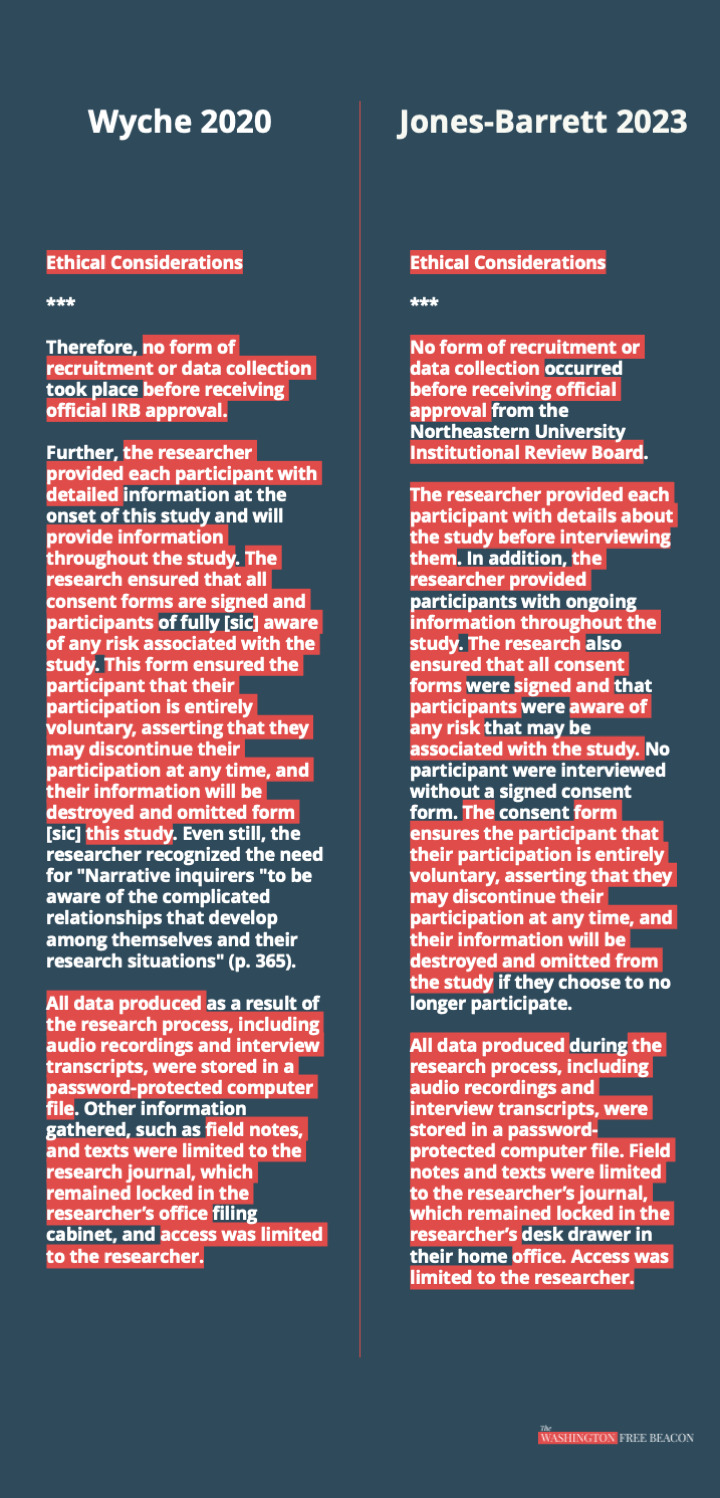
The section is one of several long passages taken from Wyche's 2020 thesis, "Boyz in the Hoods: (Re) Defining the Narratives of Black Male Doctoral Degree Completers," which does not appear in Jones-Barrett's bibliography. Wyche and Jones-Barrett did not respond to requests for comment.
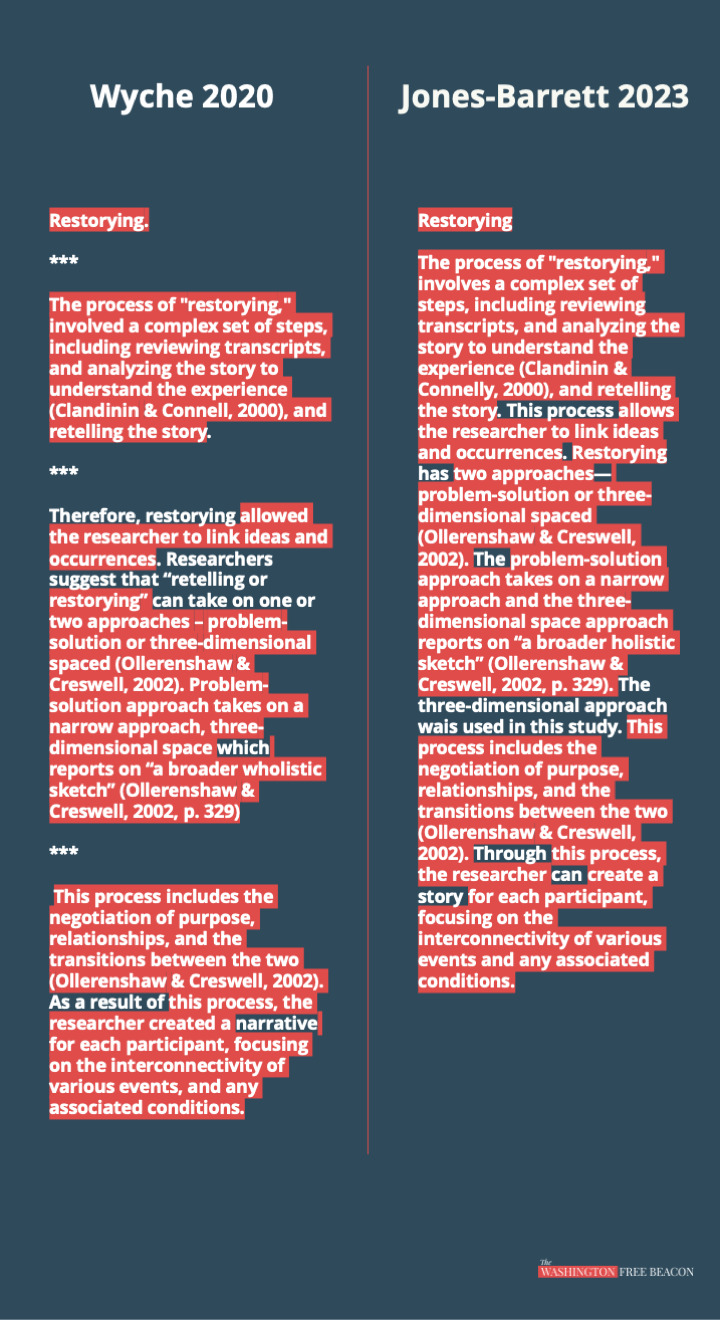
Anderson, who served as the diversity czar for MIT's computer science college until last year, when she left to become Boston Beer Company's inclusion and belonging program manager, likewise copied copious material from other scholars. Her 2017 dissertation, "#BLACKONCAMPUS: A Critical Examination of Racial and Gender Performances of Black College Women on Social Media," lifts over a page of material from Mark Chae, a professor of counseling at Pillar College, who is not cited anywhere in her dissertation.

"It would have been nice to at least get a citation!" Chae told the Washington Free Beacon in an email. "Anderson seems quite comfortable in taking credit for large portions of another writer's scholarly work."
Anderson, who held DEI posts at Boston University and Babson College before coming to MIT, lifts another long passage from Jarvis Givens, a professor at the Harvard Graduate School of Education, without an in-text citation. The omissions appear to violate MIT's plagiarism policy, which states that scholars must cite their sources any time they "use the words, ideas, or phrasing of another person."

MIT did not respond to multiple requests for comment.
In total, the two diversity deans lifted about 10 full pages of material without attribution, according to the complaint, as well as dozens of shorter passages sprinkled throughout their theses.
Like former Harvard University president Claudine Gay, who resigned in January amid her own plagiarism scandal, Anderson even stole language from another scholar's acknowledgments, copying phrases and sentences used by Khalilah Shabazz, now a diversity official at Indiana University-Purdue University Indianapolis, to thank her dissertation advisers.
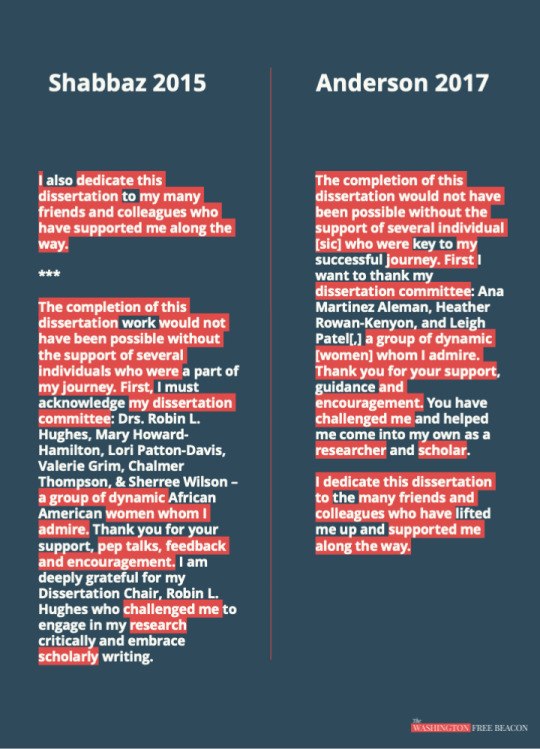
Anderson's acknowledgments contain several typos not seen in Shabbaz's, including missing words and commas and a lack of subject-verb agreement.
Givens and Shabbaz did not respond to requests for comment. Anderson, who received her Ph.D. from Boston College's school of education, did not respond to a request for comment. Boston Beer Company did not respond to a request for comment.
Saturday's complaint, which was submitted to Boston College and Northeastern University alongside MIT, is the latest in a string of plagiarism allegations against campus diversity officials. Since Gay's resignation, DEI officers at Harvard, Columbia, the University of Wisconsin-Madison, and the University of California, Los Angeles, have been accused of research misconduct. Some, such as Columbia medical school's Alade McKen and UCLA medical school's Natalie Perry, copied pages of material from various sources—including Wikipedia—while others passed off old studies as new work.
The accused administrators have not been publicly sanctioned by their universities, which have either declined to comment on the allegations or issued statements in support of the officials. The complaint against Anderson and Jones-Barrett may be harder for MIT to brush aside, however, given the school's high-profile efforts to distance itself from DEI in the post-October 7 era.
The institute said this month that it would no longer require diversity statements from candidates applying to faculty positions, making it the first elite university to jettison the practice. It also led the way in restoring SAT requirements after many colleges went test-optional in an effort to boost diversity.
The pushback has come largely from MIT faculty and been driven, in part, by a sense that DEI programs excuse and even encourage anti-Semitism. An April article in MIT's faculty newsletter noted that an event on "Jewish inclusion" had whitewashed the rhetoric of the school's pro-Palestinian protesters, who have occupied campus buildings, called for "Intifada revolution," and allegedly chanted "death to Zionists."
"Jewish students," a blurb for the DEI event read, "are encountering much of the same discomfort that other minorities face on campus and in the world, in that they don't feel heard or acknowledged."
The two dissertations at issue are strikingly derivative, cobbled together from classmates, online sources, and even a book's dust jacket, and at times read like replicas of their unattributed source material.
Jones-Barrett's summary of her dissertation, for example, is nearly identical to the summary Wyche provides of his own. Both papers use "semi-structured interviews" to "gather insights" from black graduates of Ph.D. programs about their "subjective experiences" of "meaning-making," or, as Wyche misspells it, "mean-making." The primary difference is that Wyche's study deals with black men, while Jones-Barrett's deals with black women.
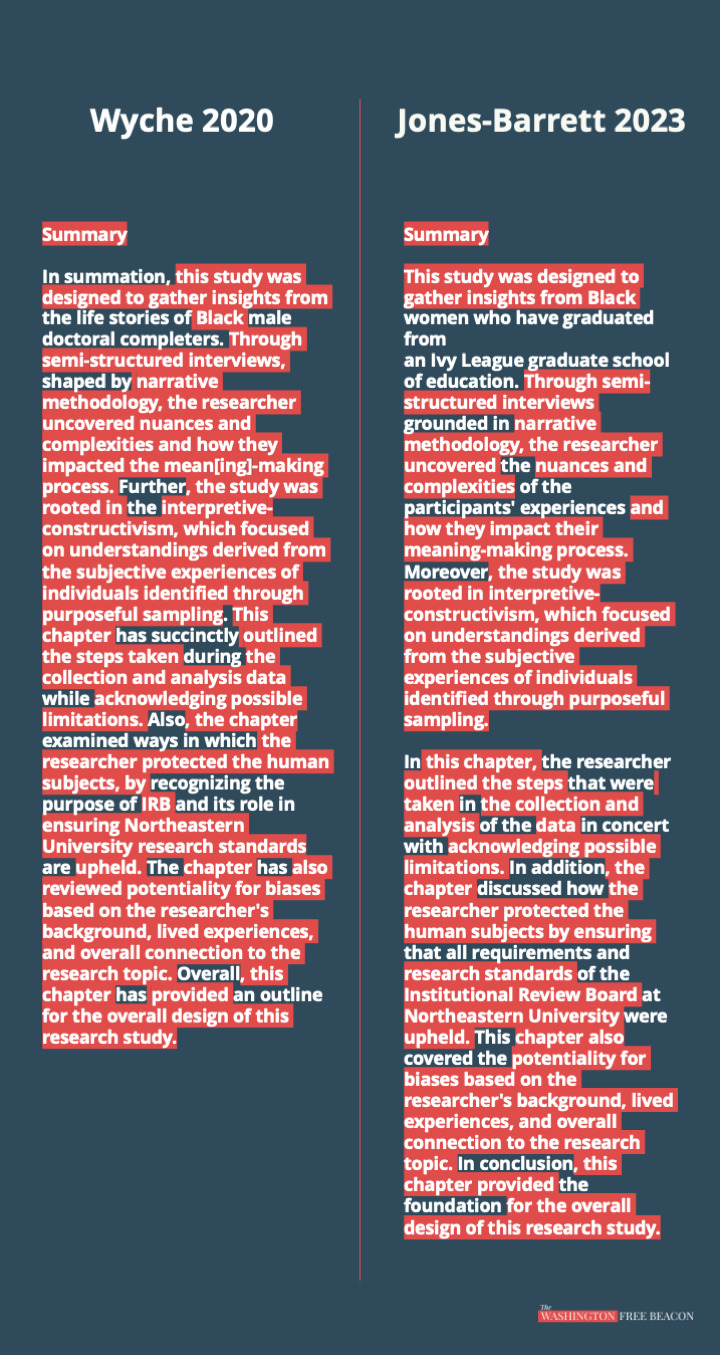
"This study, the first of its kind[,] uses Black Feminist Thought as a framework to explore and investigate how Black women at Ivy League graduate schools of education make meaning of thriving," reads the first sentence of Jones-Barrett's dissertation, which is missing a comma. "There are limited studies that center the voices of Black women at Ivy League graduate schools and there are no studies that look specifically at Ivy League graduate schools of education."
Jones-Barrett, who has taught courses at Harvard Extension School and was initially hired as the assistant dean of diversity, equity, and inclusion for MIT's humanities school, also poached a passage on "potential research bias" from Wyche—now a DEI consultant who describes himself on LinkedIn as a "status quo disrupter"—which asserts that "it is nearly impossible for the researcher to isolate their experiences from the investigative process."

He's not the only classmate Jones-Barrett appears to have plagiarized: On the first page of her dissertation, she lifts an entire paragraph from Scott Fitzsimmons, who earned his Ph.D. in education from Northeastern in 2021, without attribution, swapping out "rural EMS leaders" for "Black women in graduate programs." Fitzsimmons declined to comment.
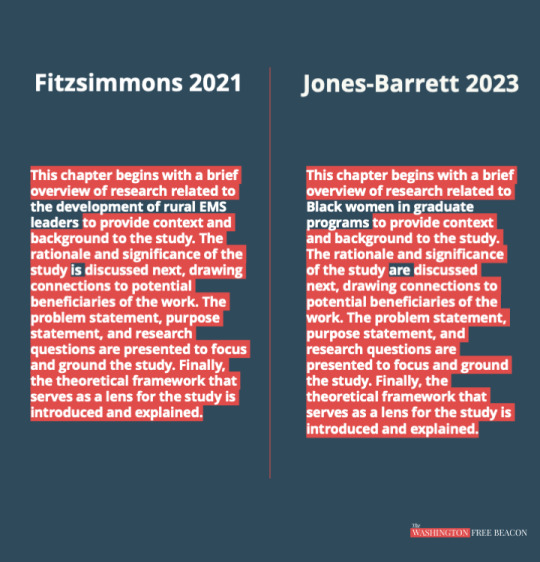
Anderson, meanwhile, lifts several paragraphs from a 2016 ThinkProgress article about her alma mater, Boston College, from which some of her study's interview subjects were drawn. That plagiarism undercuts her effort to prevent the school, to which she refers with a pseudonym, from being identified—a possible violation of the study's consent form, which promised participants that no "identifying information" would be disclosed.
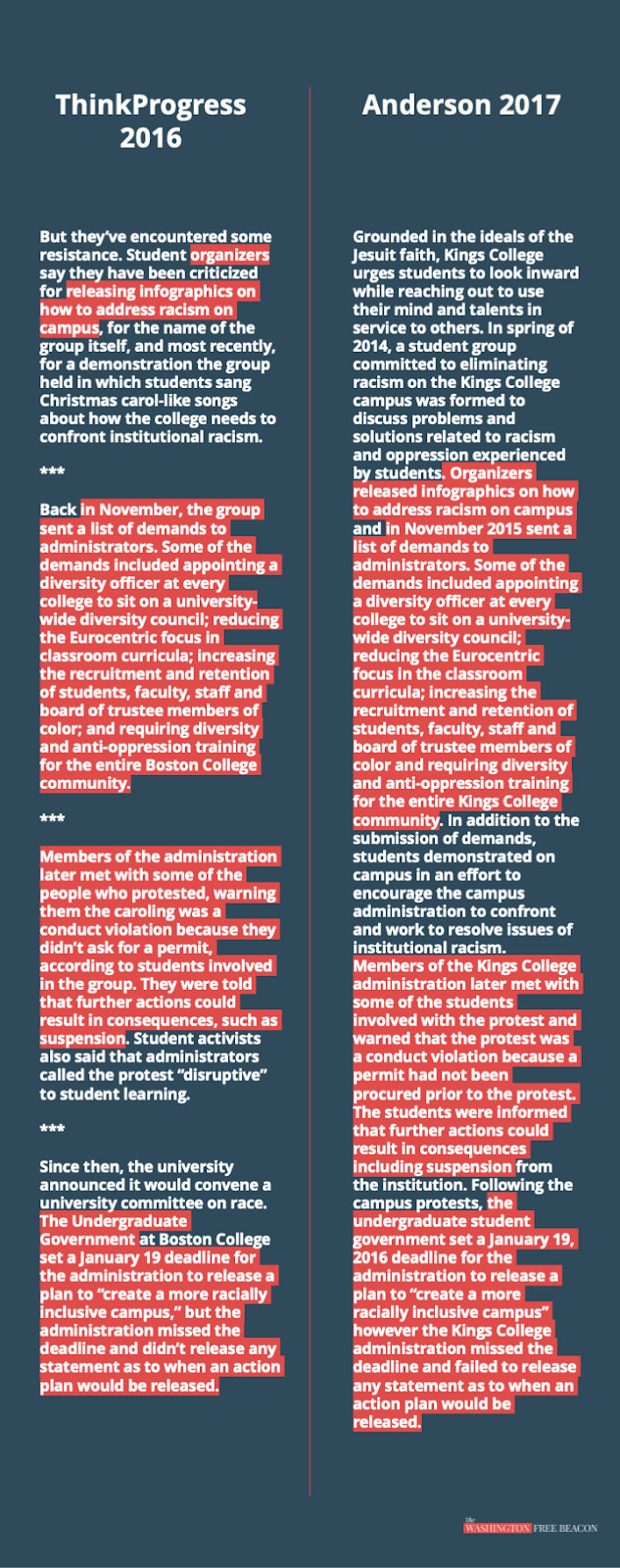
Boston College and Northeastern University did not to requests for comment.
Anderson—who runs her own consultancy that offers "scientifically-based" DEI programming—also borrows three sentences from the dust jacket of Ebony and Ivy, a 2013 book by MIT historian Craig Wilder, who is only cited in one of the sentences and whose words do not appear in quotation marks.
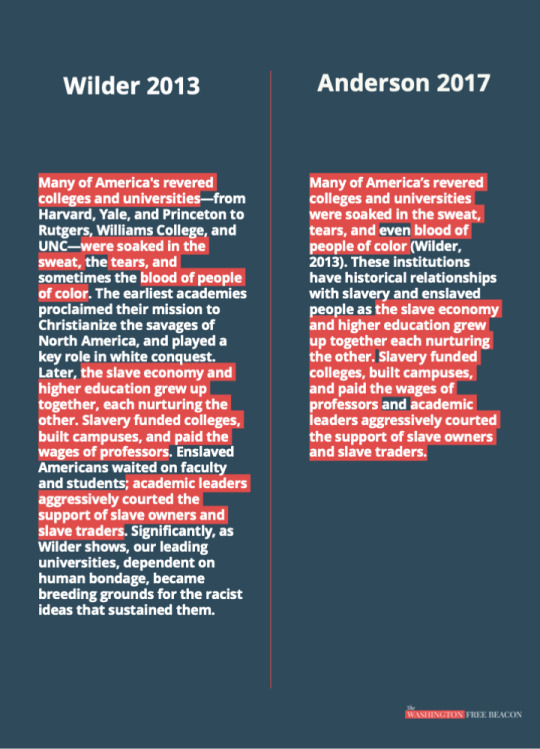
Like many of the authors plagiarized by Gay, Wilder defended Anderson's decision to copy his work, writing in an email that he didn't think a citation was necessary.
"I cannot imagine why anyone would cite a dust jacket, nor do I see the urgency of criminalizing the failure to do so," Wilder told the Free Beacon. "I'm honored," he added, when other scholars "find inspiration from my publications."
==
It's safest to assume all DEI apparatchiks and commissars are plagiarists, frauds and liars until proven otherwise.
#Aaron Sibarium#plagiarism#academic corruption#academic fraud#Alana Anderson#serial plagiarism#Tracie Jones-Barrett#DEI#diversity equity and inclusion#MIT#diversity officer#diversity#equity#inclusion#higher education#corruption of education#religion is a mental illness
7 notes
·
View notes
Text
Top MBA Colleges in Lucknow
Lucknow, the capital city of Uttar Pradesh, is home to several prestigious institutions offering Master of Business Administration (MBA) programs. Here are some of the top MBA colleges in Lucknow:
Indian Institute of Management Lucknow (IIM Lucknow)
Established in 1984, IIM Lucknow is the fourth Indian Institute of Management in India. It offers a range of postgraduate, doctoral, and executive programs in management. The institute is renowned for its rigorous academic curriculum, distinguished faculty, and excellent placement records. Admission is primarily through the Common Admission Test (CAT).
Institute of Management Sciences (IMS), University of Lucknow
IMS is a constituent of the University of Lucknow and offers MBA programs with specializations in areas such as finance, marketing, human resources, and international business. Known for its experienced faculty and industry-oriented curriculum, IMS emphasizes research and practical exposure. Admissions are based on entrance exams like CAT or the university's own entrance test.
Jaipuria Institute of Management
Established in 1995, Jaipuria Institute of Management offers a two-year full-time Post Graduate Diploma in Management (PGDM) with various specializations. The institute focuses on providing industry-relevant education and has a strong network of alumni. Admissions are based on scores from CAT, MAT, XAT, or CMAT, followed by group discussions and personal interviews.
Amity University, Lucknow Campus
Amity University offers MBA programs with a variety of specializations, emphasizing a holistic approach to management education. The university provides state-of-the-art infrastructure, experienced faculty, and opportunities for international exposure. Admissions are based on the university's entrance test and personal interview.
Babu Banarasi Das University (BBDU)
BBDU offers MBA programs focusing on developing managerial skills and leadership qualities. The university provides modern infrastructure, experienced faculty, and industry collaborations to enhance learning. Admissions are based on entrance exams like CAT, MAT, or the university's own test, followed by a personal interview.
These institutions are renowned for their quality education, experienced faculty, and strong industry connections, making them top choices for MBA aspirants in Lucknow.
2 notes
·
View notes
Text

Ambassador Joyce Anne Barr (1951) in Tacoma, Washington. She received her BA in Business Administration from Pacific Lutheran University, where she graduated Magna Cum Laude. She earned her MPA from Harvard University and holds an MS in National Resource Strategy from the Industrial College of the Armed Forces.
She entered the US Foreign Service in September 1979. She has worked in several embassies abroad. Her previous foreign assignments include posts in Stockholm, Sweden, Budapest, Hungary, Nairobi, Kenya, Khartoum, Sudan, and Ashgabat, Turkmenistan. She served as Counselor for Management Affairs at the US Embassy in Kuala Lumpur, Malaysia.
She has worked in numerous domestic capacities mostly with the State Department. She has served as a Foreign Service Recruitment Officer in the Bureau of Personnel, the Human Rights Officer for the Middle East and South Asia in the Bureau of Human Rights and Humanitarian Affairs all in the State Department. She has been assigned as a desk officer for the UN Industrial Development Organization and the World Tourism Organization in the Bureau of International Organizations.
She has participated in the Pearson Fellowship Program which allows Foreign Service Officers to work on Capitol Hill for one year to observe the legislative process.
She was nominated by President George W. Bush to serve as Ambassador to the Republic of Namibia. She was appointed Executive Director for East Asian and Pacific Affairs in the State Department. She served as International Affairs Advisor and Deputy Commandant for the Industrial College of the Armed Forces at the National Defense University. She was confirmed as the Assistant Secretary of State for Administration.
She has received both Swedish and Russian language training. She has earned three group Superior Honor Awards and a Performance Pay Award from the Department of State, in addition to an Honorary Doctorate from Pacific Lutheran University. #africanhistory365 #africanexcellence
2 notes
·
View notes
Text
youtube
From Corporate to Impact: Sparsh’s Journey with ISDM | PGP-DM Admissions Open!
"Two years in corporate left me searching for purpose—ISDM gave me the answer." – Sparsh, PGP-DM Alum
After spending two years in the corporate sector, Sparsh found himself questioning the impact of his work. Seeking a meaningful career, he joined ISDM, where he explored the social sector, gained critical management skills, and connected with inspiring changemakers. Today, he’s driving impact at Project Deep, enabling financial empowerment through unconditional cash transfers.
If you're looking to transition into the social sector and turn your skills into meaningful impact, ISDM’s 11-month Post Graduate Program in Development Management (PGP-DM) is the place to start.
Admissions are open for the Class of 2025-26!
#PGPDM#social sector#ISDM#social impact#Admissions#Post Graduate Program in Development Management (#socialchange#managementforsocialchange#Youtube
0 notes
Text
Last week, the president of Shiraz University in the southern province of Fars, offered scholarships to European and American students who have been expelled for taking part in pro-Palestinian demonstrations on campuses. “Students and even professors who have been expelled or threatened with expulsion can continue their studies at Shiraz University and I think that other universities in Shiraz as well as Fars Province are also prepared [to provide the conditions],” Mohammad Moazzeni said. Moazzeni also criticized Western police's “autocratic methods” and said the “excessive use of violence” in order to contain this “sweeping movement” and threatening to expel the students from universities and hinder their employment in the future signal the “decline of the Global Arrogance.” Later, at least twelve other prestigious Iranian universities followed suit and offered free tuition to students suspended or expelled from their universities for staging anti-Israeli protests. Shahid Beheshti University, Allameh Tabataba’i University, Iran University of Science and Technology, and Academic Center for Education, Culture and Research, all based in Iran’s capital, Tehran, and Razi University in the western province of Kermanshah, as well as Ferdowsi University in the northwestern city of Mashhad, were among higher education institutions offering scholarships to these students. Mahmoud Reza Aghamiri, president of Shahid Beheshti University, in a statement, offered students who participated in “anti-Zionist protests” fully-funded scholarships and said the university would cover all expenses, including full tuition fees, accommodation and living costs throughout the degree course. Abdollah Motamedi, president of Allameh Tabataba’i University, described anti-Israeli protests in Western countries as “unprecedented” and “auspicious,” and offered scholarships and Persian Language programs to pro-Palestinian students expelled by their universities over pro-Palestine positions. Hashem Dadashpour, a deputy science minister for student affairs, announced that Iran’s Ministry of Science, Research, and Technology has endorsed the decision announced by Iranian universities. “Iranian universities are listed among good-ranking universities and offer graduate and post-graduate programs in any disciplines students prefer to study,” he stated. Ali Khatibi, a deputy science minister for resource development and management, also said Iranian universities are “welcoming all those expelled or suspended from US universities with NO tuition fees.”
#Resistance#Iran#Students#University#Campuses#Arrest#Suspension#Scholarships#Demonstration#Free Palestine#Gaza#Gaza Genocide#Rafah#Keep Talking About Palestine
5 notes
·
View notes
Text
FORE School of Management: A Premier Institution for Future Business Leaders
When it comes to pursuing a management degree in India, FORE School of Management stands out as a top choice for aspiring business leaders. Established in 1981, the institute has consistently been ranked among the best business schools in the country. Located in the heart of South Delhi, FORE (Foundation for Organizational Research and Education) offers a dynamic learning environment that blends academic rigor with practical experience. This blog delves into why FORE School of Management should be on your radar if you’re looking to excel in the world of business.
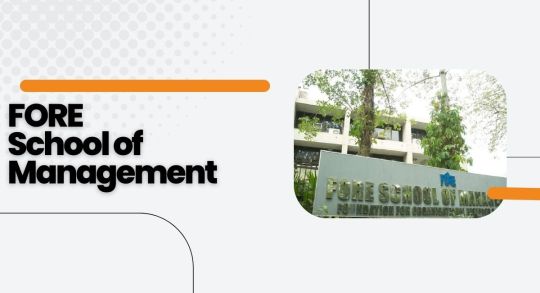
Academic Excellence at FORE School of Management
One of the primary reasons behind the success of FORE School of Management is its commitment to academic excellence. The institute offers a range of programs including:
Post Graduate Diploma in Management (PGDM): FORE’s flagship program, recognized for its cutting-edge curriculum that aligns with industry trends.
PGDM in International Business: A specialized program focusing on the global aspects of business management.
Executive PGDM: Tailored for working professionals, this course offers flexible learning without compromising on content.
PGDM in Big Data Analytics: Preparing future leaders to handle complex data-driven decision-making.
Each of these programs is designed to equip students with both theoretical knowledge and practical skills necessary for navigating today’s business challenges.
Industry-Centric Curriculum
FORE School of Management understands that the corporate world is constantly evolving. To ensure that students are prepared for these changes, the curriculum is regularly updated in consultation with industry experts. The school’s focus on experiential learning through case studies, live projects, internships, and workshops sets it apart from other business schools. This approach bridges the gap between classroom learning and real-world business applications, ensuring that graduates are industry-ready from day one.
World-Class Faculty
A business school is only as good as its faculty, and at FORE School of Management, students are mentored by some of the best minds in the academic and business worlds. The faculty comprises experienced academicians, researchers, and industry professionals who bring a wealth of knowledge and real-world insights into the classroom. Their expertise spans various disciplines, including marketing, finance, operations, human resources, and data analytics, among others.
State-of-the-Art Infrastructure
FORE School of Management provides students with a modern, tech-enabled campus that fosters learning and innovation. The school boasts:
Smart Classrooms: Equipped with the latest technology to enhance interactive learning.
Library and Information Centre: A vast repository of books, journals, and digital resources for research and study.
Computer Labs: Cutting-edge infrastructure for data analytics and other specialized software training.
Hostel Facilities: Comfortable accommodation for outstation students, ensuring a conducive living environment.
The campus also offers various recreational and fitness facilities, making it a holistic space for personal and professional development.
Strong Industry Connections and Placement Records
One of the standout features of FORE School of Management is its robust placement record. The institute has consistently attracted top-tier companies across sectors for campus recruitment. Students have landed roles in organizations like Deloitte, KPMG, EY, PwC, Nestlé, HCL, and many more.
The school’s Corporate Interaction Division (CID) plays a crucial role in fostering these relationships by organizing seminars, guest lectures, and industry visits. These initiatives provide students with the opportunity to network with industry leaders and gain valuable insights into current business practices.
Focus on Entrepreneurship and Innovation
In today’s fast-paced business world, the ability to innovate is crucial for success. FORE School of Management encourages entrepreneurial thinking and supports budding entrepreneurs through its various initiatives. The institute has an Entrepreneurship Development Cell (EDC) that provides mentorship, resources, and opportunities for students to turn their business ideas into reality.
Global Exposure
In a globalized business environment, having international exposure can set you apart. FORE School of Management offers various exchange programs and partnerships with international universities, providing students with a global perspective on business management. These programs help students gain insights into different markets, cultures, and business practices, making them well-rounded professionals ready to take on global challenges.
Conclusion
Choosing the right business school is a critical decision, and FORE School of Management offers everything you need to succeed in today’s competitive business landscape. With its strong focus on academic excellence, industry relevance, innovation, and global exposure, FORE continues to be a leader in management education. If you’re looking to build a successful career in business, FORE School of Management is undoubtedly an institution worth considering.
#fore school of management#education#higher education#colleges#education news#admissions#universities#FORE School#mba#news#students#educationnews
2 notes
·
View notes
Text
The Best Way to Turn Your MBA Dream into a Reality Jaipur
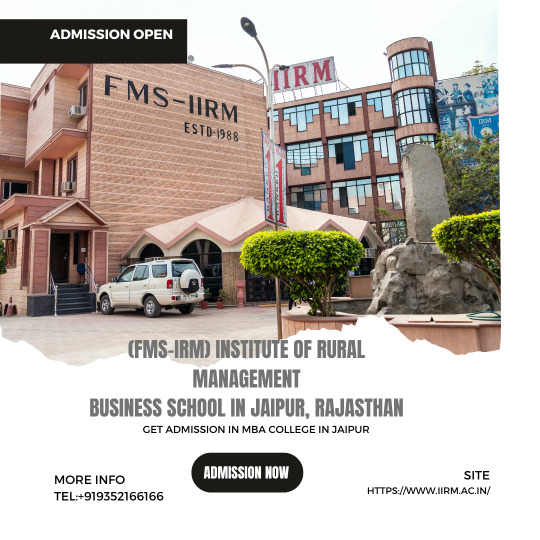
Introduction: The MBA Journey Begins
The choice to go after the MBA will change your life forever with endless opportunities to advance your career, personal development, and even financial reward. How to Get Admission in MBA College in Jaipur, particularly if you're looking to study in Jaipur? It is known for its fascinating heritage and vibrant cultural scene, Jaipur is also fast growing into a hot spot for MBA students. There are a variety of highly regarded schools, a variety of specializations, and an expanding job market It's an ideal location to begin your business career.
In this post in this article, we'll walk you through the steps you should learn about getting an MBA in Jaipur, from deciding on the perfect college to getting ready for your entrance tests to securing the dream job after graduation.
1: Why Pursue an MBA in Jaipur?
Jaipur known as"the "Pink City," is more than just a place to visit. The city has quickly become an educational hub specifically in management studies. Here's the reason Jaipur is the best option for an MBA:
Cheap Education: When compared with cities of the major league like Delhi and Mumbai, Jaipur offers quality education for less for both the cost of tuition as well as cost of living.
The growing presence of corporations in Jaipur's booming business environment and its proximity to Delhi is a prime place for young managers.
Rich Cultural Experience: cities vibrant culture, historic monuments, and a welcoming community make for a rich and satisfying learning experience for the students.
2: Top B-Schools in Jaipur for MBA Aspirants
If you're looking for MBA schools in Jaipur there are several possibilities to select from. The most well-known schools comprise:
IIRM Jaipur is a renowned institution for its special courses in rural and management growth, IIRM is a top selection for students looking for an unbeatable blend of the business world and social responsibility.
Jaipuria Institute of Management: The Jaipuria Institute of Management is a well-known institution with an excellent placement track record and a seasoned faculty.
Stani Memorial P.G. College: Offering a vibrant MBA program with an emphasis on industry experience and practical exposure.
3: Specializations Available in Jaipur's MBA Programs
The array of MBA specializations that colleges offer in Jaipur is awe-inspiring. The most popular choices are:
Finance: For people fascinated by the world of finance, investment, banking as well as corporate financial.
Marketing is a great choice for innovative people who are looking to be the best in the realm of branding and customer engagement.
Human Resource (HR) You're interested in people management and the workplace environment, HR could be the right job for you.
Rural Management: In the vast areas of Rajasthan's rural regions This emerging field is becoming more popular.
4: Admission Process for MBA in Jaipur
For you to begin your MBA experience, it's essential to know the process of admission:
To be eligible, most MBA programs need a bachelor's degree and at minimum 50% of marks.
Entrance Exams: You'll have to pass tests like CMAT, CAT, XAT or CMAT. Certain colleges will also take the state-level entrance exams.
Application Timeline: Pay attention to the deadlines that generally begin around the end of November, and last until April.
5: Cracking MBA Entrance Exams
Achieving success on MBA admissions tests is essential to be able to get into the MBA program. This is how you can increase your odds of getting into MBA:
Continuously practicing and having an organized study schedule will make a huge distinction.
Practice Tests: Try the most mock tests feasible to become familiar with the pattern of exams and effectively manage your time.
Group Discussions and Interviews: Make sure you are prepared thoroughly for these interviews since they're usually as crucial as the written test.
6: Scholarships and Financial Aid for MBA in Jaipur
Several institutions located in Jaipur give scholarships to exemplary students. The most prominent of them comprise:
Merit-based scholarships are available to those with outstanding academic records.
Government Schemes: Programmes such as that of the Rajasthan Scholarship Scheme help economically poor students.
7: The Role of Internships and Industry Exposure
One key to success when you are pursuing your MBA is to gain the experience of an internship. The business scene in Jaipur is steadily growing and offers opportunities in areas including finance, IT, and manufacturing. Internships can bridge the gap between academic training and real-world applications.
8: Networking Opportunities in Jaipur
Networking is one of the most important aspects of your MBA. When you're in Jaipur there are plenty of opportunities to meet experts in the field by attending seminars, alumni get-togethers, and even internships. Establishing these connections early could result in job opportunities and advancement in your career post-MBA.
9: What Makes Jaipur a Great City for MBA Students?
Alongside studies, Jaipur offers:
Cheap Living: When compared to larger cities, Jaipur is much easier to budget. There are affordable accommodations, and the price of living is comparatively low.
Cultural Hub: If you're a student, you'll be able to explore Jaipur's historical locations, festivals, and fascinating traditions.
10: Career and Placement Opportunities after MBA in Jaipur
The employment outlook for MBA graduates from Jaipur looks promising. Numerous companies in sectors such as FMCG, IT, and banking as well as many more hire at the best colleges in Jaipur. A few notable recruiters include:
ICICI Bank
Infosys
Reliance Industries
11: Salary Expectations for MBA Graduates
An MBA in Jaipur may bring lucrative job offers. The starting wage for an MBA student is about Rs.5-8 lakh annually, based on the area of specialization and school.
12: Challenges MBA Students May Face in Jaipur
Every journey is accompanied by many challenges and the process of obtaining an MBA is no exception. The most common issues MBA students confront may include:
Academic Stress: MBA courses are rigorous and call for lots of concentration and effort.
The art of balancing study and work If you're studying for an MBA in addition to a full-time job, balancing both could be difficult.
13: Tips for Succeeding in Your MBA Journey
Here are some helpful strategies to get you started:
Time Management: Develop an outline of your study plan and adhere to the plan.
Leverage College Resources: Take the full benefit of your school's libraries as well as mentorship programs and career services.
Conclusion
Achieving the MBA at Jaipur is exciting and rewarding. It offers low-cost educational costs, great networking opportunities, and a growing business market, Jaipur provides an ideal atmosphere for MBA hopefuls. If you're aspiring to become a financial expert or marketing professional, the city is equipped to assist reach your goals.
FAQs
What is the cost average of An MBA at Jaipur?
MBA tuition fees in Jaipur vary from as low as Rs2 to 8 lakh, depending on the school and the specialization.
Which exam for entrance is recognized to get an MBA to be taken in Jaipur?
The majority of colleges will accept CAT, scores for MAT, XAT, as well as CMAT scores.
Do I qualify for a scholarship to pursue an MBA at Jaipur?
Many colleges provide merit-based awards, and you can find government financial aid programs available.
Are Jaipur the ideal location to complete an MBA?
Jaipur is a good choice. Jaipur is a top school with a cheaper price than metros. It also comes with a wide range of career options.
What are the chances of getting a job for MBA graduates who have graduated in Jaipur?
There is a lot of interest, with top companies such as Infosys and ICICI Bank recruiting from top universities.
2 notes
·
View notes
Text
Post Graduate Diploma in Healthcare Informatics & Analytics (PGDHIA) at SIHS
Symbiosis Institute of Health Sciences (SIHS) offers you an opportunity to undergo Post Graduate Diploma in Healthcare Informatics & Analytics (PGDHIA). Healthcare informatics combine skills in healthcare business intelligence, information technology, information systems and data analytics. Doctors, nurses, and other healthcare professionals depend on healthcare informaticians to store, retrieve, and process medical data. With a Post Graduate Diploma in Healthcare Informatics & Analytics (PGDHIA) will equip the students to develop a capability in healthcare informatics and learn the technologies & skills required for the analysis of information regarding various healthcare-related factors. This programme will train the students to apply appropriate techniques to solve problems in different application areas in healthcare informatics. One can become a high-end knowledge worker in the clinical and medical fields, using information technology to help people with their health. This comprehensive program covers multiple aspects of health data informatics, including statistics for data science, augmented & virtual reality, health data analytics and artificial intelligence.
Mode of teaching: Online + Weekend Classes
Career Opportunities: 1. Chief Medical Information Officer 2. Health information Analyst 3. Healthcare IT Project Manager 4. Public Health Data Scientist 5. Health Informatics Consultant 6. Telehealth Coordinator 7. Health Information Manager 8. Electronic Medical Record Keeper
WHY SIHS ? 1. Established reputation in educational excellence. 2. World-class faculty, excellent career guidance. 3. Innovative teaching style – combination of lectures, practical training, discussions, projects, workshops. 4. State-of-the-art infrastructure. 5. Beautiful sprawling campus with excellent libraries, computer labs and Wi-Fi access. 6. Career Counselling, Training & Placement Assistance 7 Truly multicultural, dynamic and globally oriented learning environment
Admission Process - Step 1: Register online at www.sihs.edu.in and make payment of registration fees (INR 1250/-). Step 2: Attend Personal Interaction in online mode. Step 3: Check email for selection confirmation. Step 4: Verify documents and pay academic fees (INR 89,000/-).
Program Outcome - 1. Learner will be able to manage, process and analyze healthcare data 2. Learner will be able to apply knowledge gained and technical skills in the real-world healthcare settings 3. Learners will comprehend healthcare informatics principles, data analytics methodologies, and the integration of technology within healthcare systems. 4. Learners will explore machine learning, artificial intelligence, and big data analytics, understanding their applications in healthcare. 5. Learners will contribute to enhancing the quality and efficiency of healthcare services. For more details visit: https://www.sihs.edu.in/pg-diploma-in-healthcare-informatics-and-analytics
2 notes
·
View notes